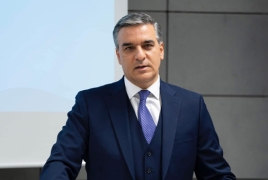
Armenia’s former Human Rights Defender Arman Tatoyan stated on Facebook that the country is seeing the destruction of the foundations of a legal state, with no functioning checks and balances—vital mechanisms in a democratic system.
He asserted that “a one-party regime and personal rule have been established in the country.”
Commenting on Prime Minister Nikol Pashinyan’s response to a journalist during the “Education is Fashionable” campaign, Tatoyan claimed it revealed that the head of government himself issues direct orders to law enforcement.
According to Tatoyan, Pashinyan believes that since the heads of law enforcement agencies are appointed either by the government or with the votes of the Civil Contract parliamentary faction, he effectively leads these bodies and holds their powers.
“It is clear from his words that he sees himself as a kind of super-investigator or head of a criminal investigation unit, responsible for planning crime prevention and operational-intelligence activities,” Tatoyan noted. He stressed that such information is classified and the Prime Minister has no legal right to access it, as it is explicitly prohibited by law.
Tatoyan highlighted the legal requirement for law enforcement to remain apolitical, while pointing out that Pashinyan is also the leader of the ruling Civil Contract party.
“This means that by usurping or interfering with the powers of law enforcement, the Prime Minister gains access to protected information and uses it at his discretion for political purposes—against his opponents,” Tatoyan wrote.
He added that this includes secretly bypassing safeguards like court oversight to unlawfully access private information, leaving the targeted individuals unaware and defenseless.
As an example, he cited the case of MP Hovik Aghazaryan, whose phone content allegedly became accessible to the Prime Minister after being handed over to the security services and was then used for political gain by the ruling party.
Tatoyan also stressed that the Prime Minister has no authority to collect personal data on clergy members. The Catholicos of All Armenians or any other clergyman holds no public office, and thus should be protected from illegal interference by the executive branch.
He warned that the concept of “private life” is broad—encompassing daily life, friendships, and business ties—not just family matters. In the case of clergy, their spiritual roles grant special protection. The Prime Minister, he noted, has no right to define the limits of a cleric’s private life.
“All this leads me to conclude that the state is being dismantled,” Tatoyan wrote, “as the foundations of a legal state are being destroyed and checks and balances no longer function.”
According to him, this means all institutions, including those meant to be independent, serve one person—who is both head of the executive and the ruling party—and who uses all power to advance personal and political interests.
“In other words, a one-party regime and personal rule have been established in the country,” the post concluded.

